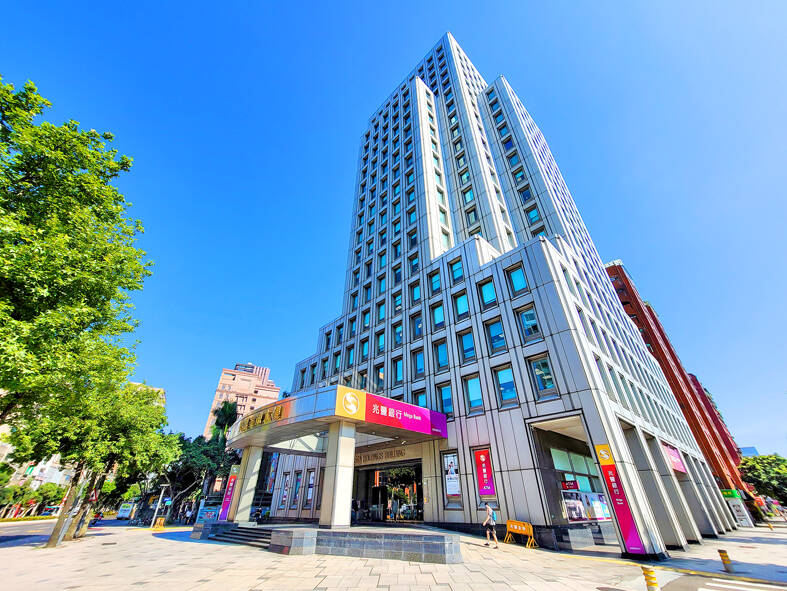State-run Mega Financial Holding Co (兆豐金控) yesterday said it expects profit momentum to stay healthy this quarter after net income in the first three quarters surged almost twofold year-on-year, thanks to strong wealth management and trading operations.
Mega Financial president Hsiao Yu-mei (蕭玉美) gave the positive guidance during an online investors’ conference.
“Mega Financial saw its net income soar 98 percent to a record high of NT$27.03 billion [US$865 million] in the first three months, or earnings of NT$1.92 per share, making it the most profitable among state-run peers,” Hsiao said.

Photo courtesy of Mega Financial Holding Co
Hsiao attributed the showings to stable core banking businesses as well as advances in wealth management and trading operations.
Cross-selling and other income enhancing strategies also bore fruit, she said.
Profit momentum would be sustainable this quarter and beyond, with interest rates hovering at similar levels at home and abroad, allowing its banking subsidiary, Mega International Bank (兆豐銀行), to take further advantage of interest rate differences between Taiwan and the US to rake in currency swap income, Hsiao said.
Currency swap profit amounted to NT$11.33 billion in the first nine months, helping lift overall trading gains by 2.8 times. Mega Bank reported a 55 percent increase in net income.
Wealth management expanded 22 percent, lending support to a 7 percent increase in fee income, the company said in a statement, adding that the world gradually emerged from a bear market seen last year.
As a result, Mega Securities Co’s (兆豐證券) net income expanded almost threefold while profit at the venture capital unit exploded 37.14 times, it said.
However, the non-life insurance wing Chung Kuo Insurance Co (兆豐產險) remained a drag, incurring a net loss of NT$1.55 billion linked to ill-fated COVID-19 policies, it said.
The figure represented a sharp easing from NT$5.6 billion losses a year earlier.

Taiwan Semiconductor Manufacturing Co (TSMC, 台積電) last week recorded an increase in the number of shareholders to the highest in almost eight months, despite its share price falling 3.38 percent from the previous week, Taiwan Stock Exchange data released on Saturday showed. As of Friday, TSMC had 1.88 million shareholders, the most since the week of April 25 and an increase of 31,870 from the previous week, the data showed. The number of shareholders jumped despite a drop of NT$50 (US$1.59), or 3.38 percent, in TSMC’s share price from a week earlier to NT$1,430, as investors took profits from their earlier gains

In a high-security Shenzhen laboratory, Chinese scientists have built what Washington has spent years trying to prevent: a prototype of a machine capable of producing the cutting-edge semiconductor chips that power artificial intelligence (AI), smartphones and weapons central to Western military dominance, Reuters has learned. Completed early this year and undergoing testing, the prototype fills nearly an entire factory floor. It was built by a team of former engineers from Dutch semiconductor giant ASML who reverse-engineered the company’s extreme ultraviolet lithography (EUV) machines, according to two people with knowledge of the project. EUV machines sit at the heart of a technological Cold

TAIWAN VALUE CHAIN: Foxtron is to fully own Luxgen following the transaction and it plans to launch a new electric model, the Foxtron Bria, in Taiwan next year Yulon Motor Co (裕隆汽車) yesterday said that its board of directors approved the disposal of its electric vehicle (EV) unit, Luxgen Motor Co (納智捷汽車), to Foxtron Vehicle Technologies Co (鴻華先進) for NT$787.6 million (US$24.98 million). Foxtron, a half-half joint venture between Yulon affiliate Hua-Chuang Automobile Information Technical Center Co (華創車電) and Hon Hai Precision Industry Co (鴻海精密), expects to wrap up the deal in the first quarter of next year. Foxtron would fully own Luxgen following the transaction, including five car distributing companies, outlets and all employees. The deal is subject to the approval of the Fair Trade Commission, Foxtron said. “Foxtron will be

INFLATION CONSIDERATION: The BOJ governor said that it would ‘keep making appropriate decisions’ and would adjust depending on the economy and prices The Bank of Japan (BOJ) yesterday raised its benchmark interest rate to the highest in 30 years and said more increases are in the pipeline if conditions allow, in a sign of growing conviction that it can attain the stable inflation target it has pursued for more than a decade. Bank of Japan Governor Kazuo Ueda’s policy board increased the rate by 0.2 percentage points to 0.75 percent, in a unanimous decision, the bank said in a statement. The central bank cited the rising likelihood of its economic outlook being realized. The rate change was expected by all 50 economists surveyed by Bloomberg. The